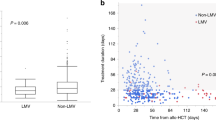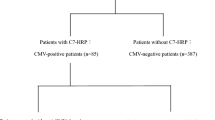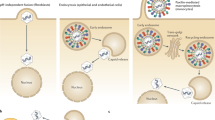Abstract
THE high prevalence of cytomegalovirus (CMV) infection in transplant recipients is well known but our understanding of the risk factors involved is incomplete. It is thought that the role of immunosuppression is probably paramount. In a series of rheumatologic patients followed prospectively after initiation of cyclophosphamide therapy, a significant proportion (43%) developed CMV infection as evidenced by viruria and serologic response1. Since most of these infections were seen in initially seropositive patients, we believe that they represent reactivations of latent (herein defined as an infection in which no virus can be detected by standard plaque assays) or inapparent infection. Presumably, reactivation by immunosuppression also occurs in transplant recipients. Another risk factor for CMV infection in renal transplant recipients is the transfer of kidneys from donors seropositive for CMV into seronegative recipients2,3. We are using the mouse cytomegalovirus (MCMV) model for better understanding of the factors involved in latency and reactivation of this group of herpeslike viruses and have shown that allografting will enhance chronic MCMV infection in the recipients4. We present here further observations on the mouse model, showing that latent MCMV infection can be reactivated by treatment with cyclophosphamide and that the transfer of latently infected spleen cells can lead to infections in recipients. We also show a role for immunosuppression in the latter situation.
This is a preview of subscription content, access via your institution
Access options
Subscribe to this journal
Receive 51 print issues and online access
$199.00 per year
only $3.90 per issue
Buy this article
- Purchase on Springer Link
- Instant access to full article PDF
Prices may be subject to local taxes which are calculated during checkout
Similar content being viewed by others
References
Dowling, J. N., Saslow, A., Armstrong, J. A. & Ho, M. Yale J. biol. Med. 49, 77–82 (1976).
Ho, M., Suwansirikul, S., Dowling, J., Youngblood, L. & Armstrong, J. New Engl. J. Med. 293, 1109–1112 (1975).
Nankervis, G. A. Yale J. biol. Med. 49, 27–28 (1976).
Wu, B. C., Dowling, J. N., Armstrong, J. A. & Ho, M. Science 190, 56–58 (1975).
Stevens, J. G. & Cook, M. L. in Perspectives in Virology 8, (ed. Pollard, M.) 171–184 (Academic, New York and London, 1973).
Mainland, D. & Murray, I. M. Science 116, 591–594 (1952).
Craighead, J. E., Hanshaw, J. B. & Carpenter, C. F. J. Am. med. Ass. 201, 725–728 (1967).
Olding, L. B., Jensen, F. C. & Oldstone, M. B. A. J. exp. Med. 141, 561–572 (1975).
Lang, D. J., Cheung, K. S., Schwartz, J. N., Daniels, C. A. & Harwood, S. E. Yale J. biol. Med. 49, 45–58 (1976).
Author information
Authors and Affiliations
Rights and permissions
About this article
Cite this article
MAYO, D., ARMSTRONG, J. & Ho, M. Reactivation of murine cytomegalovirus by cyclophosphamide. Nature 267, 721–723 (1977). https://doi.org/10.1038/267721a0
Received:
Accepted:
Published:
Issue Date:
DOI: https://doi.org/10.1038/267721a0
This article is cited by
-
Role of antibodies in confining cytomegalovirus after reactivation from latency: three decades’ résumé
Medical Microbiology and Immunology (2019)
-
Immunosuppression induces transcription of murine cytomegalovirus glycoprotein H in the eye and at non-ocular sites
Archives of Virology (1996)
-
Cytomegalovirus and latency: an overview
Virchows Archiv B Cell Pathology Including Molecular Pathology (1993)
-
Significance of herpesvirus immediate early gene expression in cellular immunity to cytomegalovirus infection
Nature (1984)
-
The murine cytomegalovirus as a model for the study of viral pathogenesis and persistent infections
Archives of Virology (1979)
Comments
By submitting a comment you agree to abide by our Terms and Community Guidelines. If you find something abusive or that does not comply with our terms or guidelines please flag it as inappropriate.



